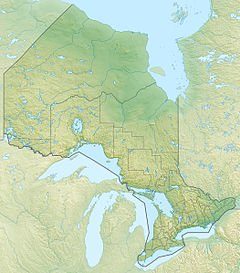| Abitibi River | |
|---|---|
 Abitibi River at Iroquois Falls | |
| Etymology | Algonquin language |
| Location | |
| Country | Canada |
| Province | Ontario |
| District | Cochrane |
| Physical characteristics | |
| Source | Lake Abitibi |
| • location | 38 km east of Iroquois Falls |
| • coordinates | 48°47′06″N 80°10′23″W / 48.78500°N 80.17306°W |
| Mouth | Moose River |
• location | 30 km SSW from Moosonee |
• coordinates | 51°04′17″N 80°55′32″W / 51.07139°N 80.92556°W |
| Length | 540 km (340 mi) [1] |
| Basin size | 29,500 km2 (11,400 sq mi)[1] |
| Basin features | |
| Tributaries | |
| • left | Black River, Frederick House River, North Driftwood River |
| • right | Sucker River, Little Abitibi River |
The Abitibi River is a river in northeastern Ontario, Canada, which flows northwest from Lake Abitibi to join the Moose River which empties into James Bay. This river is 540 kilometres (340 mi) long, and descends 265 metres (869 ft).[2] It is the ninth longest river in Ontario, Behind the Ottawa River (1,271km), St. Lawrence River (1.197km), Severn River (982km), Albany River (982km), Winnipeg River (813km), Attawapiskat River (748km), English River (615km) and Moose River(547km).
Abitibi is an Algonquin word meaning "halfway water", derived from abitah, which may be translated as "middle" or "halfway", and nipi, "water". Originally used by the French to designate a band of Algonquin Indians who lived near the lake, the name was descriptive of their location halfway between the trading posts on the Hudson Bay and those on the Ottawa River.[2][3]
The river was an important fur trading route for the Hudson's Bay Company. From 1914 Until 2014, pulp and paper, centered on the town of Iroquois Falls, was an important industry in the heavily forested region through which it flows.[2] The region also supports tourism and gold mining.[2]
The Abitibi Canyon Generating Station is located on the river at Abitibi Canyon. The experience of surveying the river for the purposes of building this plant was the inspiration for folk singer Wade Hemsworth's "The Black Fly Song".
- ^ a b Atlas of Canada Archived 2007-04-04 at the Wayback Machine
- ^ a b c d Hoiberg, Dale H., ed. (2010). "Abitibi River". Encyclopædia Britannica. Vol. I: A-ak Bayes (15th ed.). Chicago, Illinois: Encyclopædia Britannica Inc. pp. 33. ISBN 978-1-59339-837-8.
- ^ Hamilton, William (1978). Canadian Place Names. Macmillan of Canada. p. 132. ISBN 0-7715-9754-1.
